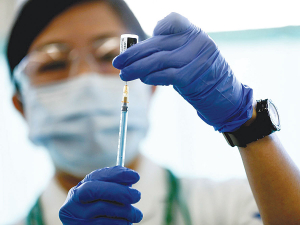M.I.A.
OPINION: The previous government spent too much during the Covid-19 pandemic, despite warnings from officials, according to a briefing released by the Treasury.
 District Health Boards are reminding Kiwis to get their flu jabs ahead of what is expected to be a tough winter.
District Health Boards are reminding Kiwis to get their flu jabs ahead of what is expected to be a tough winter.
District Health Boards across New Zealand are kicking off a push to encourage people to get their flu jabs ahead of what is expected to be a tough winter.
MidCentral DHB chief medical officer Dr Kelvin Billinghurst says it is important that people who are high-risk prepare for winter by getting their flu vaccine and Covid-19 boosters as soon as possible.
“Flu season is kicking off, the days are starting to get colder, and we’re going to see the flu make its way through the community.”
Billinghurst says that the upcoming flu season is expected to be particularly difficult.
“Some people can get very sick when they catch the flu – in most years, influenza hospitalises thousands of people, and some people die.
“After two years of lockdowns, mandates and social distancing measures in place, the flu hasn’t really had a chance to take hold. With the borders opening, we will be exposed to the circulating flu virus from overseas which is a serious concern for those who are vulnerable,” says Billinghurst.
“Receiving an annual flu jab is important because immunity wanes over time, and the vaccine changes to respond to the circulating influenza viruses at the time.”
He says it is safe to receive the flu vaccine alongside your Covid-19 vaccine.
Waikato DHB is also encouraging people to get vaccinated against the flu this winter.
“Our borders being closed for two years protected us from influenza, but now they’ve re-opened we will be exposed to new flu variants along with other viruses such as measles,” says Dr Felicity Dumble, Waikato DHB medical officer of health.
“Disease outbreaks can have serious consequences for families and communities. Those who are not immunised, whether that’s by choice or other circumstances, are worse affected by these outbreaks.”
The flu vaccine is available free of charge across New Zealand for a number of people, including those over 65 years old, Māori and Pacific people aged 55 and over, adults with health conditions such as asthma and diabetes, children aged four years or under with a history of significant respiratory illness, and pregnant women.
Those who don’t qualify for the funded vaccine can pay to be vaccinated through their GP, pharmacists and other private immunisation providers.
Canterbury arable farmers are down by tens of millions of dollars after a rollercoaster of wild changeable January weather saw harvests delayed and some crops destroyed by violent hailstorms.
Could a breakthrough in fermentation create a new multi-million-dollar export market for shiitake mushroom extracts into China?
Meadow Fresh has created the world's first fantasy sports league powered by real cows.
This year, 'Foodie February' sees potatoes take the spotlight as one of New Zealand's most powerful and versatile food heroes.
A multi-cultural team is helping to establish one of New Zealand's largest plantings of premium eating grapes - while learning each other's languages and cultures along the way.
The World Wide Sires National All Day Breeds Best Youth Camp Best All Rounder plaudit has become family affair, with 2026 Paramount Cup winner Holly Williams following in her sister Zara's footsteps.

OPINION: Meanwhile, red blooded Northland politician Matua Shane Jones has provided one of the most telling quotes of the year…
OPINION: This old mutt has been around for a few years now and it seems these ‘once in 100-year’ weather…